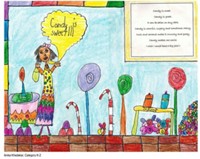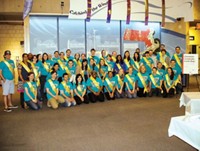Advertisement
Grab your lab coat. Let's get started
Welcome!
Welcome!
Create an account below to get 6 C&EN articles per month, receive newsletters and more - all free.
It seems this is your first time logging in online. Please enter the following information to continue.
As an ACS member you automatically get access to this site. All we need is few more details to create your reading experience.
Not you? Sign in with a different account.
Not you? Sign in with a different account.
ERROR 1
ERROR 1
ERROR 2
ERROR 2
ERROR 2
ERROR 2
ERROR 2
Password and Confirm password must match.
If you have an ACS member number, please enter it here so we can link this account to your membership. (optional)
ERROR 2
ACS values your privacy. By submitting your information, you are gaining access to C&EN and subscribing to our weekly newsletter. We use the information you provide to make your reading experience better, and we will never sell your data to third party members.
Environment
The Wonders Of Water: Chemists Celebrate Earth Day 2014
by George L. Heard, Chair Committee On Community Activities
April 14, 2014
| A version of this story appeared in
Volume 92, Issue 15
Earth Day is coming up soon, and this year’s theme is one we should all be able to relate to: “The Wonders of Water.”
Where I grew up, in the outer edges of Melbourne, Australia, water was a precious resource. Several years of drought caused the city, particularly during summer, to enforce water restrictions—restrictions that were made permanent in 2012. Water hoses could only be used if they had trigger nozzles, and gardens could only be watered with drip systems overnight. In contrast, my current town of Asheville, N.C., has just come off the wettest year on record! Meanwhile, nearly four years after the Deepwater Horizon oil spill, we are still learning the long-term effects of the accident as cleanup operations continue in the Gulf of Mexico.
“The Wonders of Water” celebrates the properties and uses of water and provides an opportunity for chemists to get involved with their communities and teach kids about a resource they may take for granted.
Get Involved. Earth Day is Tuesday, April 22, and the American Chemical Society encourages all local sections to organize a Chemists Celebrate Earth Day (CCED) event to offer some of these informal chemistry education experiences. ACS provides free resources to local outreach coordinators. Please visit www.acs.org/earthday to locate an outreach coordinator in your area as well as for tips about organizing a CCED event, educational resources, ideas for a community event, and more.
Illustrated Poem Contest. As a part of every CCED and National Chemistry Week celebration, ACS sponsors a national illustrated poem contest to engage K–12 students. All local sections are encouraged to hold a contest and invite submissions from students. Local section winners will advance to the national contest to compete for recognition and prizes.

Local Section Outreach Volunteers of the Year. The award, which is in its second iteration, acknowledges the outstanding contribution of an individual to chemistry outreach. This year, the Committee on Community Activities is honoring 65 individuals with a certificate and a gift. All awardees are featured on www.acs.org/getinvolved.
The importance of outreach really struck home for me a few weeks ago. I was supervising an outreach event for middle school students from rural counties in North Carolina. A dozen college juniors and seniors were conducting hands-on activities, most of which were adapted from ACS Science for Kids (www.acs.org/kids). I looked on, accompanied by administrators and school counselors who were amazed by the students’ enthusiastic participation in each activity. At the end, one of the middle school students said to me, “I just learned more than I have all year in school.”
To me, a statement like this highlights the need for outreach and informal education. A well-planned event can reach and inspire students in a way that the typical classroom experience cannot. I was grateful to see school counselors collecting copies of Celebrating Chemistry and activity sheets to take back to their school districts.
Views expressed on this page are those of the author and not necessarily those of ACS.
Outreach and informal science education—particularly during the early years—are extremely important as a supplement to, and in some cases as the only, science seen by students in lower elementary school. This is another reason why it’s important to do outreach!





Join the conversation
Contact the reporter
Submit a Letter to the Editor for publication
Engage with us on Twitter